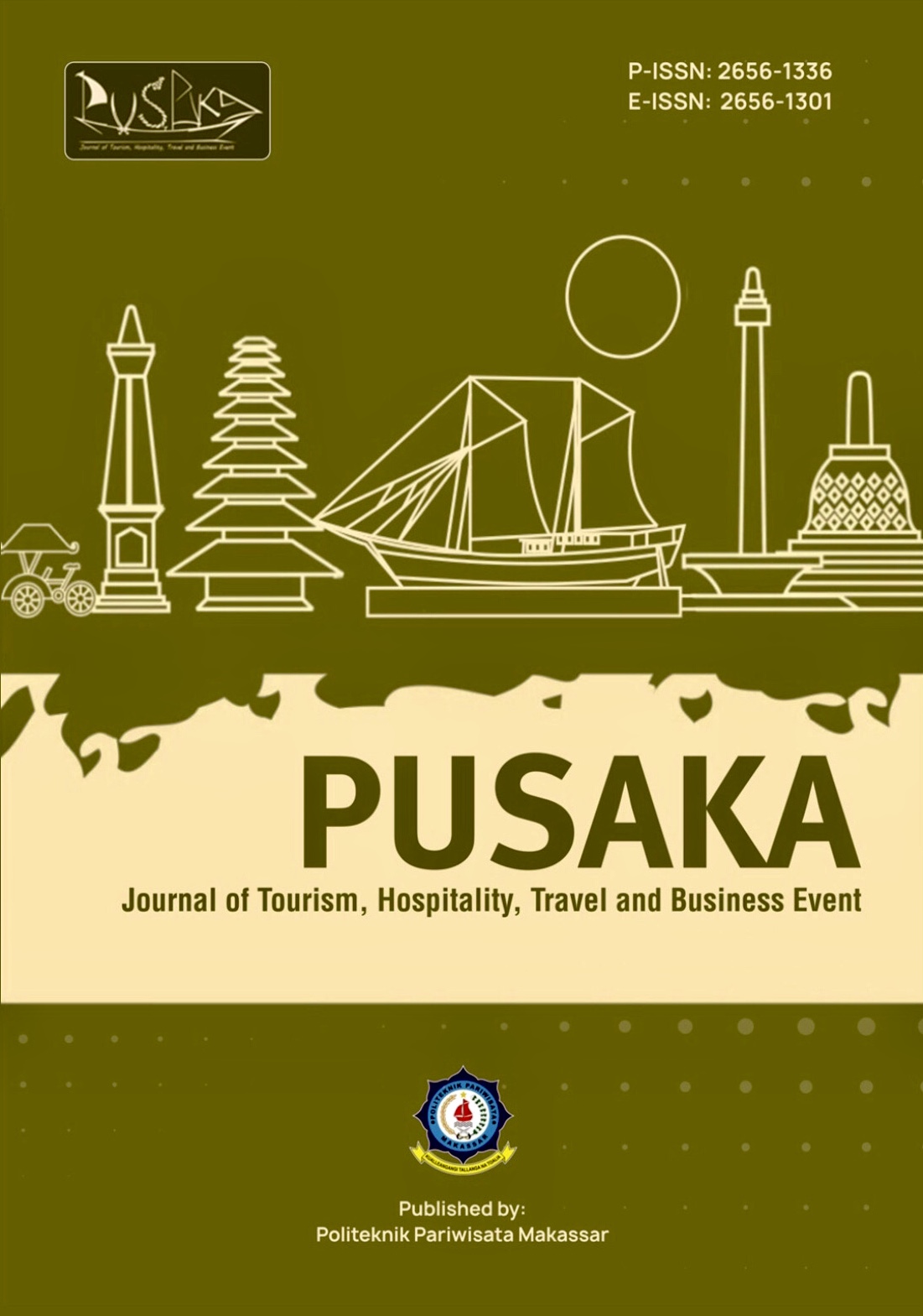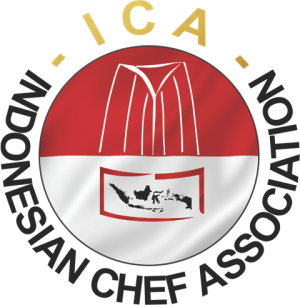Food Wastage, a Threat to Indonesian Tourism
Pemborosan Makanan, Ancaman bagi Pariwisata Indonesia
DOI:
https://doi.org/10.33649/pusaka.v6i2.305Keywords:
food waste, food loose, environmental health, sustainable environmentAbstract
The tourism sector have the impact to environmental as it shifts towards sustainable tourism development. Food waste is a one of environment continuing global issue possessing sustainability challenges in the tourism sector. Food waste is edible food that is discarded, negatively impacting environmental health. As per the 2020 report from the Food and Agriculture Organization (FAO), approximately one-third of all food produced for human consumption globally is wasted or discarded. Indonesia is among the leading producers of food waste in Southeast Asia. The 2021 UNEP annual report, food waste in Indonesia totals 20.93 million tons. The Tourism food and beverage sector, some of the biggest contributors to food waste, along with, is also by the behavior of people who may not be aware of the negative effects on food waste. This study using Qualitative method approach, with the data such as media journals, reports, journals articles and books, and will explore the behavior of domestic tourists towards food waste, especially in the Labuan Bajo area, which is one of the super priority tourist destinations in Indonesia. The study's findings give an overview of how people's attitudes and knowledge are influenced food wastage behavior.
References
Al Mamun, A., Yang, Q., Naznen, F., Aziz, N. A., & Masud, M. M. (2023). Modelling the mass adoption potential of food waste composting among rural Chinese farmers. Heliyon, 9(8), e18998. https://doi.org/10.1016/j.heliyon.2023.e18998
Annisa Bintang Kusumawardhani, Awaludin Nugraha, & Evi Novianti. (2024). Culinary Tourism in Kutawaringin (Bandung): Structural Relationship Between Food Quality, Tourist Perceptions, And Culinary Tourism Satisfaction. Pusaka : Journal of Tourism, Hospitality, Travel and Business Event, 6(1), 208–219. https://doi.org/10.33649/pusaka.v6i1.310
Berardo, I., Campos, K., Ordoñez, R., Saravia, F., Sullivan, N., & Williner, F. (2020). Fighting Food Waste in the Tourism Sector. 26, 69. https://www.oneplanetnetwork.org/sites/default/files/fighting-food-waste-in-the-tourism-sector.pdf
Boulet, M., Stott, A., & Kneebone, S. (2023). Which behaviours matter? Prioritising food waste reduction behaviours for targeted policy and program approaches. Journal of Environmental Management, 345(May), 118668. https://doi.org/10.1016/j.jenvman.2023.118668
Bretter, C., Unsworth, K. L., Kaptan, G., & Russell, S. V. (2023). It is just wrong: Moral foundations and food waste. Journal of Environmental Psychology, 88(December 2022), 102021. https://doi.org/10.1016/j.jenvp.2023.102021
Casonato, C., García-Herrero, L., Caldeira, C., & Sala, S. (2023). What a waste! Evidence of consumer food waste prevention and its effectiveness. Sustainable Production and Consumption, 41(July), 305–319. https://doi.org/10.1016/j.spc.2023.08.002
Chang, L. (1994). A Psychometric Evaluation of 4-Point and 6-Point Likert-Type Scales in Relation to Reliability and Validity. Applied Psychological Measurement, 18(3), 205–215. https://doi.org/10.1177/014662169401800302
Clement, J., Alenčikienė, G., Riipi, I., Starkutė, U., Čepytė, K., Buraitytė, A., Zabulionė, A., & Šalaševičienė, A. (2023). Exploring Causes and Potential Solutions for Food Waste among Young Consumers. Foods, 12(13). https://doi.org/10.3390/foods12132570
Delgado, A., Rodriguez, R., & Staszewska, A. (2023). Tackling Food Waste in the Tourism Sector: Towards a Responsible Consumption Trend. Sustainability (Switzerland), 15(17), 1–9. https://doi.org/10.3390/su151713226
Desak Gede Chandra Widayanthi, I Nengah Wirata, Ida Bagus Putu Puja, & Desak Putu Candra Dewi. (2024). The Impact of Ubud Food Festival on the Social and Economic Aspects of the Community in Banjar Penestanan Kaja, Ubud, Bali. Pusaka : Journal of Tourism, Hospitality, Travel and Business Event, 4(2), 155–162. https://doi.org/10.33649/pusaka.v4i2.171
Diaconeasa, Z., Iuhas, C. I., Ayvaz, H., Mortas, M., Farcaş, A., Mihai, M., Danciu, C., & Stanilă, A. (2023). Anthocyanins from Agro-Industrial Food Waste: Geographical Approach and Methods of Recovery—A Review. Plants, 12(1), 1–15. https://doi.org/10.3390/plants12010074
F.Hair, J., Black, W. C., Babin, B. J., & Anderson, R. E. (2010). Multivariate Data Analysis. In Pearson Prentice Hall (7th ed., Vol. 7, Issue 7). Pearson Prentice Hall. https://doi.org/10.3390/polym12123016
Fazal-e-Hasan, S. M., Mortimer, G., Ahmadi, H., Abid, M., Farooque, O., & Amrollahi, A. (2023). How tourists’ negative and positive emotions motivate their intentions to reduce food waste. Journal of Sustainable Tourism, 32(10), 2039–2059. https://doi.org/10.1080/09669582.2023.2264539
Fernandez-Zamudio, M. A., Zarzo, I., Pina, T., Soriano, J. M., & San Onofre, N. (2024). Assessment and Solutions to Food Waste at Congress Events: A Perspective of the MagNuS Project. Foods, 13(2), 1–19. https://doi.org/10.3390/foods13020181
Filimonau, V., Matute, J., Kubal-Czerwińska, M., & Mika, M. (2023). Religious values and social distance as activators of norms to reduce food waste when dining out. Science of the Total Environment, 868(November 2022). https://doi.org/10.1016/j.scitotenv.2023.161645
Ghozali, I. (2021). Partial Least Squares, Konsep, Teknik, dan Aplikasi Menggunakan Program SmartPLS 3.2.9 untuk peneliti. In Universitas Diponegoro (3rd ed., Vol. 3). Universitas Diponegoro.
Giordano, C., Di Fiore, G., Alboni, F., Carloni, E., Rivaroli, S., & Falasconi, L. (2023). Household Food Waste Awareness in Relation to Motivations. Sustainability (Switzerland), 15(15), 1–14. https://doi.org/10.3390/su151511582
Grgas, D., Štefanac, T., Barešić, M., Toromanović, M., Ibrahimpašić, J., Vukušić Pavičić, T., Habuda-Stanić, M., Herceg, Z., & Landeka Dragičević, T. (2023). Co-composting of Sewage Sludge, Green Waste, and Food Waste. Journal of Sustainable Development of Energy, Water and Environment Systems, 11(1), 1–14. https://doi.org/10.13044/j.sdewes.d10.0415
Hair, J. F., Risher, J. J., Sarstedt, M., & Ringle, C. M. (2019). When to use and how to report the results of PLS-SEM. European Business Review, 31(1), 2–24. https://doi.org/10.1108/EBR-11-2018-0203
Haryanti, N. (2023). Indonesia is the largest contributor of food waste in ASEAN. Infid.Org. https://infid.org/en/indonesia-penyumbang-sampah-makanan-terbanyak-se-asean/
Ismail, I. S., Othman, M. F. H., Rashidi, N. A., & Yusup, S. (2023). Recent progress on production technologies of food waste–based biochar and its fabrication method as electrode materials in energy storage application. Biomass Conversion and Biorefinery, 13(16), 14341–14357. https://doi.org/10.1007/s13399-023-03763-3
Klinik Agromina Bahari, F. P. U. (2021). ISU FOOD WASTE MENJADI PERHATIAN PERTANIAN. https://kab.faperta.ugm.ac.id/2021/09/27/isu-food-waste-menjadi-perhatian-pertanian/
Kristia, K., Kovács, S., & László, E. (2023). Food delivery platform and food waste: Deciphering the role of promotions, knowledge, and subjective norms among Indonesian generation Z. Cleaner and Responsible Consumption, 11(November). https://doi.org/10.1016/j.clrc.2023.100152
Maulana. (2023). Indonesia Penyumbang Sampah Makanan Terbanyak Se-ASEAN. Https://Infid.Org. https://infid.org/indonesia-penyumbang-sampah-makanan-terbanyak-se-asean/
Närvä, M., Alarinta, J., & Wirtanen, G. (2023). Needs to Change Behaviour in Households Producing Lots of Food Waste. International Journal of Food Studies, 12(1), 29–41. https://doi.org/10.7455/ijfs/12.1.2023.a2
Natalia, T. (2024). Darurat! Sampah Makanan Orang RI Tembus Ratusan Triliun. CNBC Indonesia. https://www.cnbcindonesia.com/research
Nisaputra, R. (2023). Setiap Tahun 1,3 Miliar Ton Makanan Terbuang Sia-Sia, Nilainya Tembus Ratusan Triliun. Https://Infobanknews.Com/. https://infobanknews.com/
Pandey, S., Budhathoki, M., Perez-Cueto, F. J. A., & Thomsen, M. (2023). Factors influencing consumers’ food waste reduction behaviour at university canteens. Food Quality and Preference, 111(September), 104991. https://doi.org/10.1016/j.foodqual.2023.104991
Rozaki, Z. (2021). Food security challenges and opportunities in indonesia post COVID-19. Advances in Food Security and Sustainability, January, 1–51.
Schrank, J., Hanchai, A., Thongsalab, S., Sawaddee, N., Chanrattanagorn, K., & Ketkaew, C. (2023). Factors of Food Waste Reduction Underlying the Extended Theory of Planned Behavior: A Study of Consumer Behavior towards the Intention to Reduce Food Waste. Resources, 12(8). https://doi.org/10.3390/resources12080093
Sekaran, U., & Bougie, R. (2016). Research Methods for Business (Seventh). John Wiley & Sons, Inc.
Somlai, R. (2023). Insights into business strategies for reducing food waste in the Australian food industry. Business Strategy and the Environment, 32(6), 3151–3164. https://doi.org/10.1002/bse.3292
Tsalis, G., Boutrup Jensen, B., & Aschemann-Witzel, J. (2024). The relationship between retail price promotions and household-level food waste: Busting the myth with behavioural data? Waste Management, 173(September 2023), 29–39. https://doi.org/10.1016/j.wasman.2023.10.032
Universitas Negeri Semarang. (2023). Sejauh Mana Indonesia Darurat Sampah Makanan? https://unnes.ac.id/feb/sejauh-mana-indonesia-darurat-sampah-makanan/
van Herpen, E., Wijnen, T., Quested, T., Reynolds, C., & Sharda, N. (2023). Convenient tools and social norms: Measuring the effectiveness of an intervention to reduce household food waste. Journal of Cleaner Production, 429(November), 139604. https://doi.org/10.1016/j.jclepro.2023.139604
Waluyo, & Kharisma, D. B. (2023). Circular economy and food waste problems in Indonesia: Lessons from the policies of leading Countries. Cogent Social Sciences, 9(1). https://doi.org/10.1080/23311886.2023.2202938
Downloads
Published
How to Cite
Issue
Section
License
Copyright (c) 2024 Diena Mutiara Lemy, Elang Kusumo, Reagan Brian

This work is licensed under a Creative Commons Attribution-ShareAlike 4.0 International License.






















